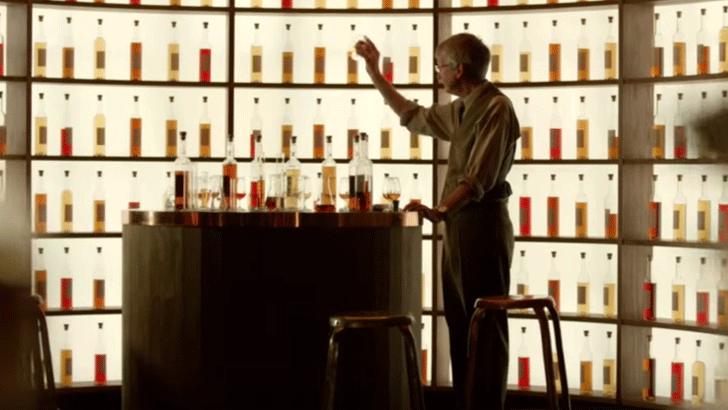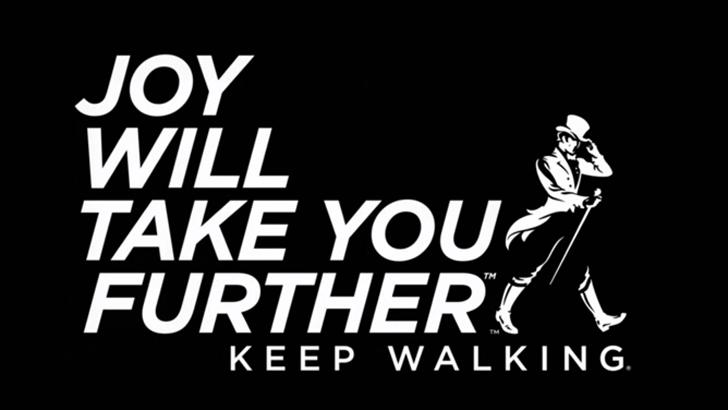Scotch whisky: How to regain momentum?
- Published

A one minute video advert has been produced for Johnnie Walker
It is reckoned to be the most valuable spirits brand in the world of alcohol.
Brand Finance put it at number 246 in its 2015 top 500 brands by value. The consultancy reckoned that the brand alone - not including the business behind it - is worth £3.6bn.
Yet to keep Johnnie Walker ahead of the pack worldwide requires a lot of continued investment and of creative spark.
Advertising is often persuading you to buy something you don't need, and having done so, to choose one brand over another.
But with alcohol as with tobacco, advertisers are obliged - in some markets, at least - to be careful about how they portray their product.
The result can be a campaign that appears to have nothing much to do with the product itself, and everything to do with selling a lifestyle, an image and even an ideology.
That is where the creatives behind the latest incarnation of Johnnie Walker marketing have been at work, external.
Their new advertising campaign has just been launched in 50 countries, with the intention of reaching 270 million people within 10 days.
(I should, at this point, say that a lot of other whisky brands are available. This is not a plug for one brand so much as a look at the thinking behind a significant marketing and advertising event, and one that probably matters for the whole industry.)
'Keep walking'
The brand managers, including Diageo chief executive Ivan Menezes, were in London last night, explaining their thinking to industry analysts.
That's a clear and deliberate choice of audience. They need to persuade investors that a big budget for this re-launch is tied to a business plan to turn around a fall in Johnnie Walker sales last year.
The distilling giant launched the "Keep Walking" slogan with Johnnie Walker's striding man motif in 1999, and bought heavily into a presence in Formula 1.
It's not unreasonable to claim that was the global brand and marketing campaign that did most to drive whisky's growth more widely. Johnnie Walker sales went from 10 million cases in 1999 to 19.1 million in 2013.
Diageo also grew market share in a fast-growing market. Scotch sold 8.4 million cases into emerging markets in 2003, rising to 21.5 million last year. During that period, Diageo's share of emerging markets rose from 41% to 49%.

The distilling giant launched the "Keep Walking" slogan with Johnnie Walker's striding man motif in 1999
But last year, it suffered as the global growth of Scotch hit various elements of turbulence. That included slowing emerging market growth, currency volatility, and official disapproval in China of conspicuous gifting and hospitality.
To refresh the "keep walking" striding man after 16 years, Diageo claims to have dug deep into the psyche of its target market - apparently aged around 30, mostly male, internationally-minded and "carving their own paths".
What they found was aspiration, much of it to be their own bosses, but insecurity, often around pressure to succeed and to perform.
The Diageo response is a campaign that seeks to "flip the formula for success - to help people see that happiness actually fuels success, not the other way round".
You're right - this doesn't appear to have much to do with blended distilled spirit. They're not allowed to tell you that drinking Scotch whisky makes you happy, but they are expert at implying it.
They do it by selling an image, an association with cool celebrity and thrill-seeking, slightly James Bond retro with colourful urban chic, and a positive philosophy. It comes with marketing blurb that should not always be taken seriously.
According to Guy Escolme, Johnnie Walker's global brand director: "What two centuries of experience have taught us is that progress doesn't have to be an endless uphill journey.
"We can enjoy the steps we take, and the more happiness we find in them, the more likely we are to achieve our goal. Evidence is confirming a conviction that sits at the heart of our brand: 'Joy Will Take You Further'."
Cultural impact
And there you have the slogan, adapted across advertising platforms.
At the movies: "Talent wins admirers. Joy wins fans."
At the airport check-in: "Travel plans will get you there. Joy will get you further."
Trackside in athletics: "Does crossing the line bring you joy? Or does joy bring you across the line?"
From Anomaly, the advertising agency commissioned by Diageo, chief strategy officer Amanda Feve has a prediction: "Our research unlocked a new insight into progress, which we believe will create cultural impact the world over."
It's a big claim. You can be the judge.